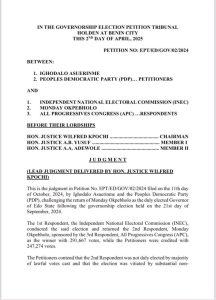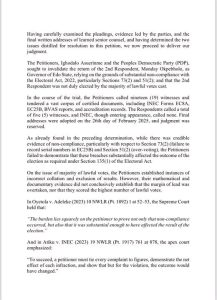Politics
Switch to Parliamentary system : We cannot change our system of governance the way we switch from foreign football coach to local -Senator Osunbor tells advocates
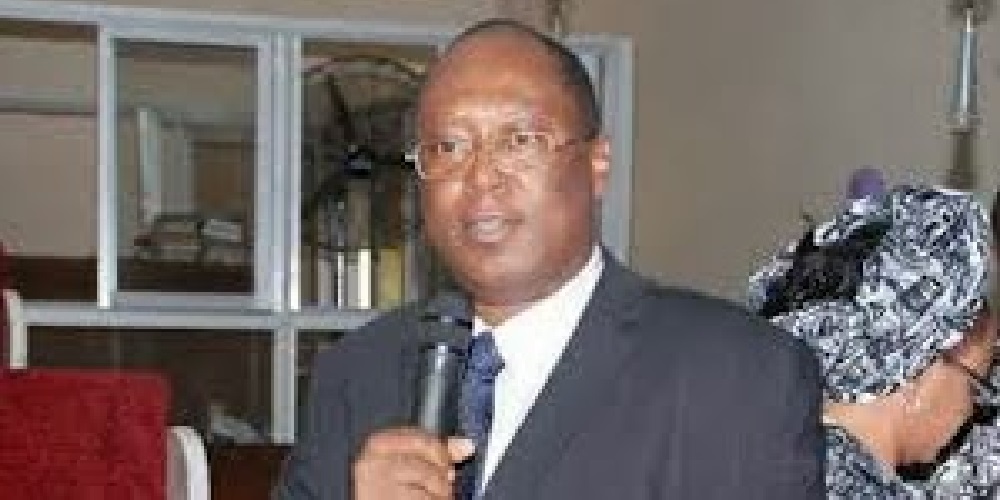
…so far so good presidential system has fared better in 29years
…wonders why Senate President, Speaker, media refer to NASS as parliament
Former Governor of Edo State, Senator Oserheimen Osunbor has said the switch from presidential to Parliamentary system of governance being advanced by some Nigerians fails the test of logic and scientific analysis.
The two term senator also wondered why the Nigerian media, Senate President, Speaker refer to National Assembly as Parliament.
Osunbor, a Professor of Law made this disclosure in a chat with journalists in Abuja on Friday.
He said: “It seems to me that most of those advocating the adoption of the parliamentary system are not aware or have forgotten that Nigeria started off in 1960 with a parliamentary system .
“The weakness of that system contributed largely to the collapse of the First Republic,after only five years, in January 1966. By contrast, the presidential system has been practiced for about 29 years now. On this score alone the presidential system has obviously fared better and proved superior to the parliamentary system.
” For them to be persuasive, those calling for the return to the failed parliamentary system should show that they understand the flaws that led to the collapse of the system in the First Republic and convince Nigerians that those weaknesses will not recur.
“Unfortunately, the advocates are not engaging in such logical scrutiny but are simply being sentimental and unscientific in voicing their preference for the parliamentary system.
” The reasons commonly advanced in support of the parliamentary system are firstly , that it is cheaper to operate. Secondly, that the presidential system breeds pseudo-dictatorship as it confers too much powers on the President and Governors.
Osunbor further explained that it is the Nigerian people that make the presidential system expensive and turn executive office holders into pseudo-dictators. Even if we were to return to the parliamentary system the same elected office holders will continue to approve for themselves outrageous emoluments and bogus allowances.
“A Prime Minister and Ministers can still become autocratic if the society accepts or encourages it.
” Example of this can be drawn from some countries that operate the parliamentary system. First Republic Minister of Finance, Festus Okotie- Eboh, was reputed to be very flamboyant, if not extravagant and that was under the parliamentary system.
“Operation Wetie” in Western region and events leading to the Nigerian civil war happened under the parliamentary system.
” Or have we forgotten parliamentarians, some of them illiterate, that rode in the longest American Pontiac that guzzled petrol at 8 miles per gallon.
” I personally have strong reservation against continuous experimentation with our system of governance with attendant political Instability without sound well thought – out reasons. We should not reduce governance to our style of football administration that oscillates like a pendulum from local coach to foreign coach and back to local coach without any improvement on our performance.
“As the immediate past foreign coach G.Rohr, and others before him, have revealed, the main problem with our football performance is lack of commitment, dedication and indiscipline. It has nothing to do with the colour of the skin of the coach. It is about our attitude as Nigerians.
” On a related matter, I cannot understand why many Nigerians, including the media, now refer to our National Assembly as parliament. Even the Senate President and Senators refer to the Senate as parliament. Same with the speaker and members of the House of Representatives.
Whereas the constitution empowers them to enact an Act of the NASS, many of them assert that they’ve passed an Act of Parliament.
The 1963 Constitution , in chapter 5 , vested legislative powers in parliament created in Section 41 thereof but that constitution is now defunct. In its place we now have the 1999 Constitution which, in section 4 , vested legislative powers in a National Assembly consisting of a Senate and a House of Representatives, not Parliament.
“There is no reference to “Parliament ” in our current Constitution. I cannot understand why people choose to use a name outside our constitution. The U.S. has a congress, Britain has a parliament and Nigeria has a National Assembly. Is
this too difficult to understand?
Rather than call themselves “this parliament” Senators can say “this Senate” or “this Chamber”. Members of the HoR can say “this House” or “this Chamber”.
” Referring to the National Assembly or each of its two Houses as “Parliament” creates an erroneous impression that we run a parliamentary system.
This can be confusing to many especially foreigners who are not familiar with our constitution. I have had occasion in the past to explain the correct position to a foreign expert who had been under the wrong impression that we operate a hybrid system of the French model due to the indiscriminate use of the term “Parliament” by Nigerians.
” Without changing our attitude to governance we will be perpetually going round in circles by continuously changing from one constitution to another or from one system of governance to another.
Politics
Just in: Confusion As Edo Guber Tribunal ‘Judgment’ Leaks Online

A document alleged to be the judgment of the Edo State Governorship Election Petition Tribunal has surfaced online, just a day before the official ruling is set to be announced.
The tribunal had previously scheduled April 2, 2025, for the formal delivery of its judgment regarding the petition filed by the Peoples Democratic Party (PDP) and its candidate, Asue Ighodalo, challenging the outcome of the September 21, 2024, election.
The leaked ‘judgment,’ which appeared on social media, shows a split decision among the three-member panel led by Justice Wilfred Kpochi. According to the documents, two of the justices, Kpochi and A.B. Yusuf, ruled to dismiss the petition, while Justice A.A. Adewole gave a minority judgment in favor of Ighodalo.
In the leaked minority judgment, Justice Adewole argued that Governor Monday Okpebholo’s election should be nullified due to significant violations of the Electoral Act. He claimed that Ighodalo and the PDP had provided enough proof that their candidate should have received 243,113 votes compared to Okpebholo’s 210,326 votes, which would have changed the election’s outcome.
“The petitioners’ case was not rebutted, and they showed unit by unit how the actual total should be 243,113 votes, while the 2nd Respondent’s tally should stand at 210,326 votes—a clear reversal of the declared result,” Justice Adewole reportedly wrote.
On the other hand, the majority ruling by Justice Kpochi acknowledged that some irregularities occurred, such as improper documentation of serial numbers in EC 25B forms and cases of over-voting. However, the tribunal concluded that these issues did not significantly impact the election results.
Justice Kpochi stated, “The petitioners have not discharged the dual burden to the satisfaction of the law. Accordingly, the petition lacks merit and is hereby dismissed.”
The Independent National Electoral Commission (INEC) had earlier declared Okpebholo of the All Progressives Congress (APC) as the winner, with 291,667 votes, while Ighodalo of the PDP secured 247,655 votes. Dissatisfied with the results, Ighodalo and his party argued that the election was flawed due to improper handling of sensitive materials, which they claim led to rigging.
The case, officially registered as EPT/ED/GOV/02/2024, questions the legitimacy of Okpebholo’s victory, with the PDP insisting that their candidate received the highest number of lawful votes.
As the tribunal prepares to announce its ruling, the leaked documents have sparked debate over whether the final decision will align with what has already surfaced online.
Politics
SDP cautions defectors against taking control of the party

The leadership of the Social Democratic Party (SDP) in Southwest at the weekend made clarification on the new membership of the former Minister of the Federal Capital Territory ( FCT) , Mallam Nasir El-Rufai and others who recently joined the party.
According to the party, new members are expected to play the game by the rules , and not to hijack the party from those who are there before them.
Speaking at a meeting of the party during an Iftar organized by the Oyo State chapter of the party for stakeholders in the 11 local governments in Ibadanland, the leader of SDP in the South West, Hon. Mulikat Adeola Akande declared that the party will take careful measure to ensure that only candidates that are tested and trusted are presented in the 2027 general elections.
On the defection of former governor of Kaduna State, Mallam Nasir El-Rufai to the SDP, Hon Mulikat Akande said “politics is a game of numbers and anybody who wants to come into SDP is welcome as long as they are ready to play by the rules of the party and not with the mind of taking the party from those who are there before.”
She said she was not aware that the motive of the former Minister of the Federal Capital Territory FCT, to join the SDP is to become the presidential candidate of the party in 2027.
Hon Akande , while commenting on the chances of the party, said the SDP would ensure that only credible candidates are allowed to fly the party’s flag in the next general elections.
“ You don’t just sit down and say you want to win election and then go and bring out anybody. We must have the right candidates, somebody tested and trusted,who has integrity that when people hears his name they can rely on him. Someone who is dependable and reliable who will work for the people and not for himself. Those are the qualities we are looking for,” she said
Hon Akande further charged party faithful to remain loyal to the party so as to ensure its success at the polls urging intending members to register at their various wards.
Politics
Recall process incurs higher costs than senatorial election, says INEC

The Independent National Electoral Commission has outlined the complexities and costs involved in the recall process, likening it to organising a full election.
These were communicated on Saturday via X Spaces as the commission discussed “INEC Regulations and Guidelines for recall 2024. BVAS and IREV: Facts and Myths.”
The Special Adviser to the INEC Chairman, Prof. Mohammed Kuna, explained that a recall election involves significant resources, including staff mobilisation, technology, and recall material deployments, and transportation.
He noted that the process is more expensive than a senatorial election, requiring efforts equivalent to conducting three such elections.
“A recall process is like conducting an election itself. It has to do with mobilisation of staff, deployments of recall materials, technologies, transportation, among others.
“A recall process is like conducting three senatorial district elections because we will go back to the field three times. It is more expensive than conducting a senatorial election.”
Also, the Chief Press Secretary to the INEC Chairman, Rotimi Oyekanmi, reaffirmed the Commission’s commitment to following legal guidelines in the event of a recall.
“If constituents express the desire for a recall and fulfill the necessary requirements, we will proceed accordingly,” Oyekanmi said.
He added that if a seat in the National Assembly becomes vacant and INEC is informed by the Presiding Officers, a by-election would be conducted.
Regarding the financial aspects, Oyekanmi assured that INEC has provisions in place for all potential scenarios.
“We prepare for all situations, as we are aware of the unpredictability of electoral events,” he stated, ensuring that the Commission is ready for any developments.
INEC received a petition seeking the recall of Senator Natasha Akpoti-Uduaghan, who represents Kogi Central Senatorial District.
The petition, presented on behalf of the constituents by Charity Ijese, was received and stamped by INEC’s Secretary, Rose Oriaran-Anthony, on Monday at the Commission’s headquarters in Abuja.
The recall petition followed a series of contentious events involving Akpoti-Uduaghan, who was suspended from the Senate on March 6 for alleged “gross misconduct” after a dispute with Senate President Godswill Akpabio.
She had previously accused Akpabio of sexual harassment.
The constituents, who claim to have met the constitutional requirements for the recall process, stated that over 200,000 registered voters, more than half of the district’s electorate, signed the petition.
The commission further confirmed that a letter containing the telephone numbers, email addresses, and other contact information of the petitioners’ representatives was submitted on Wednesday to the Commission’s Chairman, Prof. Mahmood Yakubu.
The commission noted that the next phase in the process would involve INEC verifying whether the petition has been endorsed by more than 50 percent of the registered voters in Kogi Central.
-

 News17 hours ago
News17 hours agoTinubu Sacks NNPC Board, Appoints New Leadership
-

 News17 hours ago
News17 hours agoHe came to propose to me, and died in my hostel
-
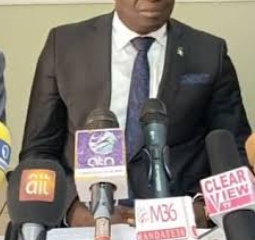
 News11 hours ago
News11 hours agoVideo: Watch Dr Nwambu of CCLCA analyse ex-River HoS allegations against suspended Gov Fubara
-

 News17 hours ago
News17 hours agoAkpabio, Yahaya Bello Conspired To Assassinate Me – Senator Natasha Makes Fresh Allegation
-

 Business6 hours ago
Business6 hours agoBank stops transfer fees on online transactions
-

 Sports17 hours ago
Sports17 hours agoSuper Eagles Must Defeat South Africa to qualify for 2026 World – Eric Chelle
-

 Sports17 hours ago
Sports17 hours agoSaka scores as Arsenal beat Fulham to close gap on Liverpool
-
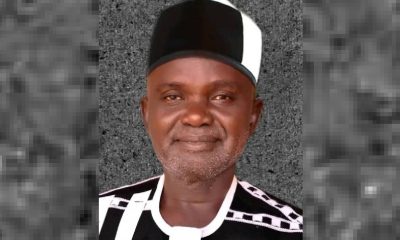
 News16 hours ago
News16 hours agoWike sympathies with Ortom over younger brother’s death














